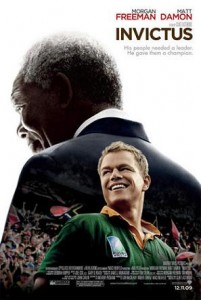 While everyone else watched the Superbowl last night, I watched the 1995 Rugby World Cup. Or, rather, Clint Eastwood’s take on South Africa’s sport, politics, and forgiveness: Invictus.
While everyone else watched the Superbowl last night, I watched the 1995 Rugby World Cup. Or, rather, Clint Eastwood’s take on South Africa’s sport, politics, and forgiveness: Invictus.
In my defense, I didn’t actually know it was Superbowl Sunday.
(Oh wait. Maybe that’s not such a great defense. I plead Canadianitis.)
For those who don’t know the film’s premise: Mandela becomes President of South Africa, turns an Afrikaner game (rugby) into a national symbol, victories abound, and many white people hug black children.
I emerged happy. It effectively manipulated the underdog-wins-pleasure-zone of my brain–in both the sport and political arenas. That alone is worth nine dollars.
Fundamentally this is a movie about leadership: the power of one man’s compassion and principle to carry the day–be that a country or a rugby match.
It is also, perhaps unintentionally, a movie about luck: luck that leads a failing rugby team to triumph in the last minutes of overtime; luck in Mandela’s gamble to make a symbol of Apartheid into a source of national unity.
To me, that makes the movie a powerful metaphor for the South Africa of 1994. The country tilted towards civil war. Leadership and luck pulled it back.
For someone who studies war for a living, this is a difficult thing to digest. Social scientists want systemic factors to operate; levers to pull; policies to manipulate. But leadership and luck, these reside in the error term. My considered belief: I think Clint Eastwood may be closer to the truth than the social scientists.
I retreat, therefore, into sentiment. In the movie, Morgan Freeman (Mandela) gives Matt Damon (the Rugby Captain) a copy of Invictus, a stirring poem he kept on a scrap of paper in prison.
In reality, however, Mandela gave Pienaar a different passage, Teddy Roosevelt’s Man in the Arena:
It is not the critic who counts; not the man who points out how the strong man stumbles, or where the doer of deeds could have done them better. The credit belongs to the man who is actually in the arena, whose face is marred by dust and sweat and blood; who strives valiantly; who errs, who comes short again and again, because there is no effort without error and shortcoming; but who does actually strive to do the deeds; who knows great enthusiasms, the great devotions; who spends himself in a worthy cause; who at the best knows in the end the triumph of high achievement, and who at the worst, if he fails, at least fails while daring greatly, so that his place shall never be with those cold and timid souls who neither know victory nor defeat.
Go to sleep tonight wishing for more Mandelas.

10 Responses
Not to mention the fact that the All Blacks were poisoned and the film didn’t show them vomiting on the sidelines throughout the entire match. Revisionist history, much?
I saw the movie and liked it. Now I am interested in reading some good sttuf about Mandela and South Africa (academic and non-academic). Dou you have any sugestion?
Thanks
Manoel Galdino
Your interesting insights are noted in the D3 blog. You should read Robert Swope’s insights on foreign policy since he too has some unique perspectives at http://www.robertswope.com/home/2010/2/12/d3-weekly-link-roundup.html. Thanks and keep up the good work.
Quickly,
The film’s portrayal of rugby aside (it’s was like watching wrestling) and the contrast of Mandela with other black characters (he sees the long view, they’re shortsighted and vindictive, “Invictus” plays fast and loose with the facts:
Consider, for example, that Chester Williams, the only black player in that team, later wrote an autobiography where he accused his teammates and coaches of racism; that Mandela himself would TWO years later announce that he wanted to institute a public commission of inquiry into racism in that sport (the president of the rugby union, Louis Luyt–he has a sort of bland role in the film–took Mandela to court); and finally, right now white supporters of the team can’t reconcile themselves with the team’s black coach–who has the best record relative to previous coaches of the national team at this stage in their careers–or refer to all the black players–some of whom won the international rugby board’s player of the year awards– as not being qualified.
I’d also refer you to this review by Ryan Gilbey:
http://www.newstatesman.com/film/2010/02/mandela-film-invictus-pienaar
Agree with JL above, the book is amazing! Definitely worth the read!
Very good point about luck. I agree that social scientists’ hypothesized explanations often don’t adequately account for the possiblity that there may not *be* an explanation.
Haven’t seen it, but I think the reading of this story in the press and presumably the film is all a bit simplistic, though isn’t it? That team did do a lot of Black South African rugby (Bryan Habana claims it was watching this final that made him want to play). But the team were a bit dodgy. Wasn’t there one player on it who had just been accused of beating a black servant to death on his farm?
Mandela’s biography by John Carlin (Playing the Enemy: Nelson Mandela and the Game That Made a Nation) on which the movie is based is well worth a read too.
I am taking a Phd seminar on power and leadership and in my head have been trying to relate it to development and democracy issues. My conclusion after these first 5 weeks is that leadership is not luck and that leaders can be developed. When I come up with more than that, I’ll write more.
I also very much enjoyed this movie. Thoughtful storytelling. Thanks for the tidbit at the end about the Roosevelt passage. I didn’t know that.